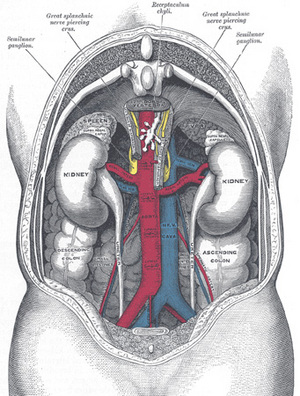The two kidneys are part of both the Urinary and Endocrine Systems. They are two of the most important internal organs in the body primarily functioning to filter blood, regulate the urinary system and produce hormones. The process by which the kidneys channel pollutants and chemicals out of our systems by filtering toxic and potentially toxic chemicals from the bloodstream produces urine that carries waste materials from the body. The kidneys maintain a stable chemical balance and internal physical environment for cells by regulating water, electrolyte and acid base balances in the body.

Kidney Illustration from WikiPedia
As the primary removal site for potentially toxic and toxic chemicals each kidney contains 1.2 million filtering units called nephrons. Each nephron is the functional unit of the kidney having a glomerulus. In a process called filtration, blood containing waste products enter the glomerulus where the cells extract the water and waste products as urine, as the blood leaves. Blood flows into a network of capillaries surrounding each tubule from the glomerulus where substances that the body still needs such as water and certain salts are restored to the blood. The purified blood is then returned to general circulation throughout the body and waste in the form of urine passes through the ureter into the bladder. Astonishingly the kidneys can filter 500 quarts of blood daily most all of which is reabsorbed returning to the bloodstream.
Functions of the Kidneys
– Elimination of metabolic wastes
– Blood pressure regulation
– Erythrocyte production – erythropoietin
(stimulates red cell production)
– Vitamin D activation
– Prostaglandin synthesis
– Acid – Base balance
(excretes alkaline salts)
– Fluid balance
– Electrolyte balance
Crystals form in urine from various salts that build up on the inner surfaces of the kidney. Eventually these crystals become large enough to form stones in the kidney (called nephrolithiasis).
Such salts may include calcium oxalate, uric acid, cystine, or xanthine. These salts can become extremely concentrated under certain circumstances: if the volume of urine is significantly reduced (chronic thirst and dehydration); or if abnormally high amounts of crystal-forming salts are present (infection). When concentration levels reach the point at which the salts no longer dissolve, they precipitate out and form crystals.
Stones may also form in the ureter or the bladder. The salts that form these stones are made up of combinations of minerals and other chemicals, some of which are derived from a person’s diet.





